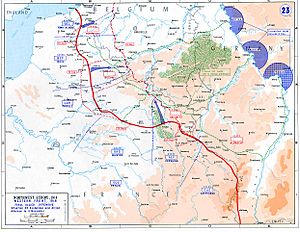Fifth Battle of Ypres facts for kids
Quick facts for kids Fifth Battle of Ypres |
|||||||
|---|---|---|---|---|---|---|---|
| Part of the Western Front of the First World War | |||||||
|
Map of the final Allied offensives on the Western Front, 1918 |
|||||||
|
|||||||
| Belligerents | |||||||
|
|
|||||||
| Commanders and leaders | |||||||
| Strength | |||||||
| 28 divisions | 16 divisions | ||||||
| Casualties and losses | |||||||
| 10,000 POW 300 guns 600 machine guns |
|||||||
The Fifth Battle of Ypres was a series of important battles fought near the city of Ypres in Belgium during World War I. It is also known as the Advance of Flanders or the Battle of the Peaks of Flanders. This battle took place from September 28 to October 2, 1918, and was a key part of the final push by the Allied forces to end the war.
Contents
What Was the Fifth Battle of Ypres?
The Fifth Battle of Ypres was not just one big fight. Instead, it was a group of attacks by the Allied armies in northern France and southern Belgium. These attacks happened in the last few months of World War I, when the war was coming to an end. The goal was to push back the German army and win the war.
The Western Front in 1918
World War I was fought on many fronts, but the Western Front was one of the most important. It was a long line of trenches and battlefields that stretched across Belgium and France. For most of the war, neither side could move much, leading to a stalemate.
By 1918, the war had been going on for four years. The German army had tried a big attack in the spring, but it failed. Now, the Allied forces, which included soldiers from Belgium, Britain, France, Canada, and the United States, were ready to fight back. They launched a series of attacks called the "Hundred Days Offensive." The Fifth Battle of Ypres was a major part of this final push.
Who Fought in the Battle?
Many countries were involved in the Fifth Battle of Ypres.
- The Allied Powers included:
- Belgium, led by their King, King Albert I.
- The United Kingdom, with General Herbert Plumer as a key commander.
- France, led by General Jean Degoutte.
- Canada, whose soldiers played a big role.
- The United States, who had recently joined the war.
- The Central Powers were mainly the German Empire, led by commanders like Erich Ludendorff and Crown Prince Rupprecht.
The Allied forces had about 28 divisions (large groups of soldiers), while the German army had about 16 divisions. This meant the Allies had more soldiers ready for the attack.
What Happened During the Battle?
The battle began on September 28, 1918. The Allied forces launched a strong attack along a wide front. They aimed to break through the German defenses and capture important high ground, like the "Peaks of Flanders." These hills had been battlegrounds for years and were very important for controlling the area.
The Allied soldiers pushed forward, facing tough resistance from the German army. However, the German forces were already tired from years of fighting and recent defeats. They were also running low on supplies and soldiers.
Over just a few days, the Allied armies made significant progress. They recaptured many towns and villages that had been under German control for a long time. They also captured many German soldiers and a lot of their equipment, including guns and machine guns.
Why Was This Battle Important?
The Fifth Battle of Ypres was a big victory for the Allies.
- Territory Gained: The Allies took back a large area of Belgium, including the city of Ypres, which had seen some of the bloodiest battles of the war.
- German Retreat: The German army was forced to retreat even further, losing important defensive positions. This made it harder for them to continue fighting.
- End of the War: This battle, along with other Allied victories during the Hundred Days Offensive, showed that the German army was losing. It helped lead to the end of World War I just over a month later, on November 11, 1918.
- Fewer Casualties: Compared to earlier battles in the Ypres area, this battle had fewer casualties for the Allies. This was because the German army was weaker and less able to defend itself.
The Fifth Battle of Ypres was a crucial step in bringing World War I to an end and bringing peace back to Europe.
 | Misty Copeland |
 | Raven Wilkinson |
 | Debra Austin |
 | Aesha Ash |


